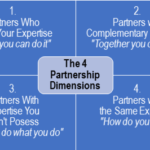Managing IT professionals better by understanding their NEEDS
 One of the key issues in managing an organization of IT people is understanding their needs. Understanding this helps managers motivate their staff better, align rewards and to UNDERSTAND how the engine they are managing works. I find most managers like to view their staff as machines that are expected to behave in particular ways determined by organizational policy or the whims of the project, client or situation. While the environment is a powerful influencer to behavior, understanding underlying needs is critical to understanding the net sum orientation of the team. Without this managers end up providing corporate incentives no one wants, say things that don’t encourage people and find themselves struggling to understand why the project team isn’t delivering as well as they thought they would.
One of the key issues in managing an organization of IT people is understanding their needs. Understanding this helps managers motivate their staff better, align rewards and to UNDERSTAND how the engine they are managing works. I find most managers like to view their staff as machines that are expected to behave in particular ways determined by organizational policy or the whims of the project, client or situation. While the environment is a powerful influencer to behavior, understanding underlying needs is critical to understanding the net sum orientation of the team. Without this managers end up providing corporate incentives no one wants, say things that don’t encourage people and find themselves struggling to understand why the project team isn’t delivering as well as they thought they would.
Overall this is a complex subject, which is exactly why people shy away from it. There are several models to understanding people’s needs. We have all heard of Maslow and his hierarchies. Evolutionary psychologists have similar ideas on why we need what we do and how that evolved. I find these models mostly generalized and hard to apply to an IT Management scenario. I list a few simple things that I think are practical and implementable:
Control
Understand the need for control of your staff. Most high achievers have a high need for control. You often find them complaining about how the “client is getting in their way” and “if only they would let me do my job”. This is usually a sign of them trying to take back control or a conflict between their need to control their life/work vs. the client’s need for control (via things like reporting, processes etc.) . On the same note, you will find people who WANT to be controlled. These are usually the slow-and-steady bunch, usually acclimatized to being controlled with the passage of time and through past experiences. These people will appreciate process and look for direction often. Indeed they view it as critical to their growth and “to keep things sane”.
So what? If they need control, back off. Give them space. Set clear boundaries but let them roam within it. If they need control, provide process, templates, guidelines, frequent feedback and as much structure as you can.
Identity
This would be the answer to the question, “Who are you?”. We have an internal model of who we are. This is generally pretty static over time but if influenced by external factors. Who we are is generally in context of external factors though. Look for ways and patterns in how people describe themselves (provide opportunities for them to do that). They will describe their personality orientations, their desires, ideals, and values. Externally, look for groups they associate with: these can be work groups, nationality or ethnic associations – these can be powerful influencers in how they see themselves.
So what?: If you present ideas that are too far away from people’s identities, you will find yourself them struggling to accept them.
Arousal
Three kinds of ways people want to be aroused: Cognitive, Emotional and Physical
Cognitive: Most IT people I know are information junkies, they spend most of their day sifting through information or talking to people who do. They get a certain high from learning something new and want to constantly get that feeling. Reading books, discussions on these, solving puzzles and the likes all make them feel they are using their key asset (their brains).
Emotional: No its not just women who have emotions. We all need to FEEL. Ask the average consultant to name basic emotions and they probably will struggle. IT Consultants in particular are particularly prone to not realizing their own emotional needs. Most consultants deal with people who hired them for the experience (the heart of a services business is experience). They need to have a high Emotional Quotient. Key there is recognizing when you feel a certain way and then knowing healthy ways to deal with that. Denying these leads to a lot of scenarios when you “cant tell why he behaved the way he did”.
Physical: You would be surprised how much the occasional game can help







